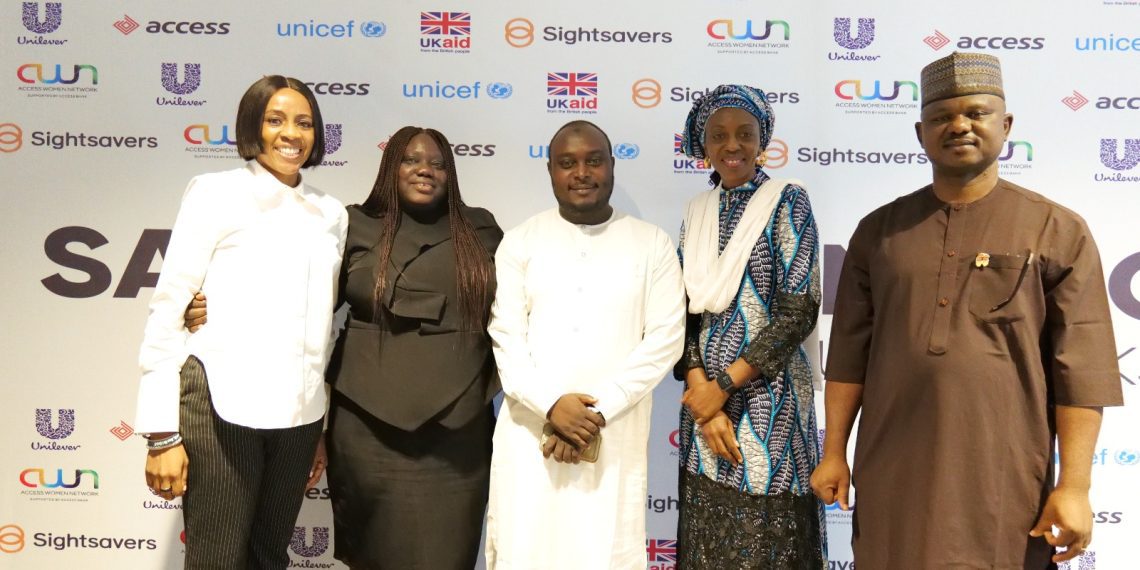Sightsavers has launched the “Strengthening Access to Business Education and Inclusion (SABI)- Woman” project, an initiative that is aimed at improving the financial know-how and economic inclusion of Women and girls with disabilities.
Razak Adekoya, Sightsavers technical advisor (Economic Empowerment) while giving an overview of the project at the official launch in Lagos, said the project aims at boosting employability, and entrepreneurial capacity and advocating financial inclusion of 1500 young girls and women with disabilities in the age range of 18-24 and starting them off on correctly chosen career paths or businesses.
Adekoya also explained that through the project, “we will also build the professional and career capacity of 1300 adolescent girls with disabilities aged 13-17. What we are trying to do in this regard is to help these girls have aspirations as well as the necessary skills and guidance to help them”.
According to Adekoya, financial inclusion is an aspect of the project to which Sightsavers is fully committed. He noted that the financial inclusion plan of the federal government, as articulated by the Central Bank of Nigeria (CBN) lacks adequate provision for inclusion of persons with disabilities.
“So what we will do through this project is to advocate for, and strengthen that financial inclusion strategy to ensure there is a pathway and clear financial inclusion guidelines from the Central Bank. This will help guide banks on the need to ensure their products and services benefit persons with disabilities – especially women and girls”, Adekoya emphasized.
Jumoke Alagbe, Sightsavers’ institutional funding senior advisor noted a strategic aim of the project is to skill up adolescent girls with disabilities in senior secondary schools to widen their career aspirations through skills development and mentoring.
Speaking on the Girls Education and Skills Partnership (GESP) a subsume of SABI-Woman, Alagbe pointed out that it is a public-private partnership between the UK government and major global businesses to empower young women with skills and opportunities with partners such as Unilever, Pearson, PwC, Microsoft, Accenture, among others.
According to her, “the programme sets out to address the challenge of skills deficit amongst adolescent girls, and the pressing need to diversify education financing.”
One of the partners, Access Bank, reiterated its unwavering commitment to leading the charge for inclusion in and around the workplace, especially the private sector.
Access Banks’s Chief Brand and Communication Officer, Amaechi Okobi, in his speech highlighting the bank’s involvement in SABI-Woman project, said, “This initiative marks a significant stride forward in the bank’s unified mission to advance diversity, inclusion and equitable opportunity for all”.
According to him, Access Bank aims to inspire adolescent girls with disabilities in senior secondary schools towards nurturing their career aspirations through skill development and mentorship opportunities initiative of the ‘Women of Access Women Network’.
James Lalu, Executive Secretary, National Commission for Persons With Disabilities (NCPWD) who officially launched the SABI-Woman project remarked on how essential the initiative is to the disability community.
While lauding Sightsavers and Access Bank for their interventions, Lalu noted that the dynamic trend in business and business opportunities around the world requires that the disability community be streamlined to tap in.
Lalu said, “We have a lot of persons with disabilities who are practically into business, therefore it is important as an institution to do everything possible to provide and develop the necessary policy environment for persons with disabilities”.
Accordingly, Lalu revealed that the NCPWD is taking responsibility for marketing businesses to persons with disabilities.
Earlier in her welcome speech, Dr. Joy Shuaibu, Sightsavers Country Director appreciated participants, partners and sponsors. She remarked on the project being Sightsavers’ way of contributing to national economic development. Shuaibu emphasized how the business side of SABI-Woman increases the chances of PWDs becoming employers of labour aside from providing job opportunities.
“This is how we feel PWDs will also contribute their quota to national and economic development”, she said.
The project is being implemented in collaboration with Access bank, Unilever, United Nations Children’s Education Fund (UNICEF), Industrial Trust Fund (ITF), the National Commission for Persons With Disabilities (NCPWD), among others.
The project launch was graced by representatives of partners and collaborating organizations including the Joint National Association of Persons with Disabilities (JONAPWD), Project Enable Africa, and Kanawa Foundation.

